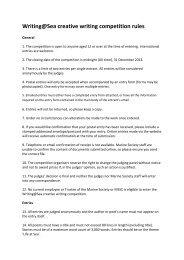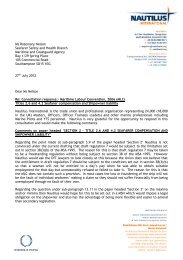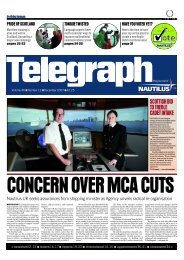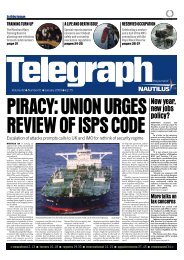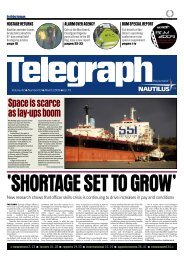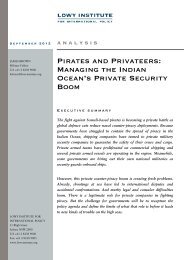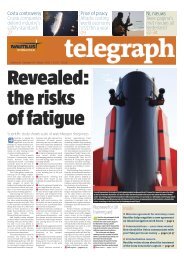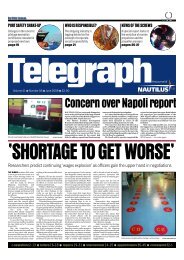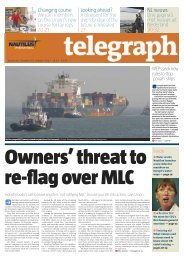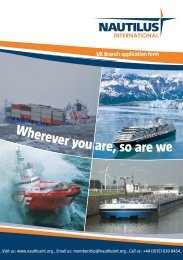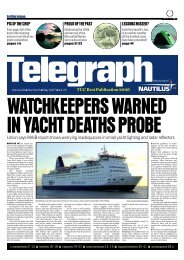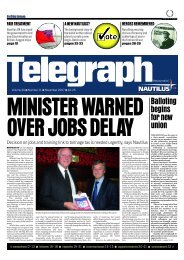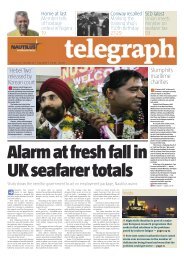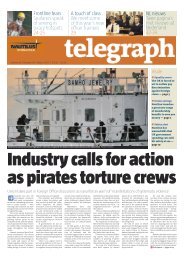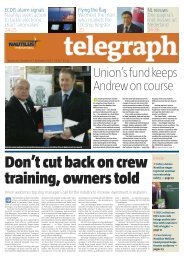NAUTILUS P01 OCTOBER 2010.qxd - Nautilus International
NAUTILUS P01 OCTOBER 2010.qxd - Nautilus International
NAUTILUS P01 OCTOBER 2010.qxd - Nautilus International
Create successful ePaper yourself
Turn your PDF publications into a flip-book with our unique Google optimized e-Paper software.
October 2010 | nautilusint.org | telegraph | 13<br />
HEALTH&SAFETY<br />
Bulk carrier crew tried<br />
to cover up ‘hit and<br />
Shortage<br />
of skilled<br />
seafarers<br />
prompts<br />
P&I alert<br />
run’ with fishing boat<br />
The shortage of skilled and<br />
Hexperienced seafarers is<br />
starting to drive a ‘vicious circle’ of<br />
declining safety standards at sea and<br />
ashore, a major P&I club has<br />
warned.<br />
Crew of UK-flagged ferry praised for ‘exemplary seamanship’ in responding to distress calls<br />
P<strong>Nautilus</strong> has expressed<br />
alarm at a horrifying ‘hit<br />
and run’ incident in the<br />
Channel in which the crew of a<br />
Singapore-flagged bulk carrier<br />
tried to cover up evidence that<br />
they had been involved in a fatal<br />
collision with a fishing vessel.<br />
Concerns over the incident —<br />
which occurred in December<br />
2009, some 15nm north of the<br />
Cherbourg peninsula — were<br />
intensified after accident investigators<br />
found that many ships in<br />
the area ignored distress flares<br />
and Mayday messages.<br />
But both <strong>Nautilus</strong> and the<br />
Marine Accident Investigation<br />
Branch have praised the crew<br />
of the UK-flagged ferry Norman<br />
Voyager for responding and<br />
rescuing the three surviving fishermen.<br />
The MAIB said the ferry’s officers<br />
and crew had demonstrated<br />
‘exemplary seamanship and carried<br />
out a safe and efficient rescue<br />
‘in the best traditions of the Merchant<br />
Navy’.<br />
The collision occurred as the<br />
87,052dwt Alam Pintar, en route<br />
to Hamburg from Canada, twice<br />
struck the Weymouth-registered<br />
crabber Etoile des Ondes.<br />
Investigators said the bulker’s<br />
officer of the watch had seen<br />
Etoile des Ondes and realised<br />
there was a risk of collision, but<br />
his initial attempts to prevent a<br />
collision were rendered ineffective<br />
when the fishing vessel also<br />
changed course while heaving<br />
and shooting pots.<br />
The OOW ordered the wheel<br />
hard-a-starboard, but it was too<br />
late to prevent the collision.<br />
When the bulk carrier’s master<br />
arrived on the bridge, he was told<br />
the vessel had probably hit a fishing<br />
boat which had been seen ‘still<br />
afloat and well lit’ after the collision.<br />
The master checked the radar<br />
and saw a moving target astern of<br />
Alam Pintar, which he assumed to<br />
be the fishing vessel and so he<br />
ordered the ship’s engines to be<br />
increased to full speed.<br />
At this time distress flares<br />
were fired by the crabber’s survivors<br />
and a Mayday relay audible<br />
on the bridge indicated that a<br />
fishing vessel in the area required<br />
assistance.<br />
‘Shortly after the initial “all<br />
ships — Mayday Relay” Jobourg<br />
MRCC contacted Alam Pintar<br />
specifically to ask the master to<br />
confirm if he had heard the<br />
broadcast or seen the red flares<br />
which were near his position,’ the<br />
MAIB report notes. ‘The master<br />
assured Jobourg MRCC that he<br />
had not.’<br />
As Alam Pintar continued on<br />
passage to Hamburg, the ship’s<br />
documents and recordings,<br />
including those of the voyage<br />
data recorder, were altered or<br />
removed in an attempt to obscure<br />
any evidence suggesting a collision<br />
with Etoile des Ondes. The<br />
MAIB said the master’s decision<br />
to carry on after the collision and<br />
continuing on passage was ‘illegal,<br />
immoral and against all the<br />
traditions of the sea’.<br />
Alam Pintar — which was<br />
operated and managed by PACC-<br />
Ship (UK) with a Chinese master<br />
and officers — had an inexperienced<br />
bridge team on duty at the<br />
time, the report adds. The fourth<br />
officer — who had just two<br />
months in rank — and unqualified<br />
first-trip cadet did not comply<br />
with the requirement to keep<br />
EU to ‘name and shame’<br />
The Singapore-flagged Alam Pintar,<br />
left, and above evidence of the<br />
collision with the fishing vessel<br />
Etoile des Ondes Pictures: MAIB<br />
a lookout and the actions taken<br />
by the OOW indicated a lack of<br />
appreciation of what could be<br />
expected from a vessel engaged<br />
in fishing.<br />
The MAIB said the attempts to<br />
alter or destroy evidence were illegal<br />
and foolish.<br />
‘Accident investigators have a<br />
mass of information, both on<br />
board and elsewhere, which will<br />
rapidly identify such actions,’ the<br />
report adds.<br />
‘Most technical recording<br />
devices will record all attempts to<br />
tamper with the evidence. Such<br />
attempts serve purely to turn an<br />
accident into a crime.’<br />
Noting 20 other cases since<br />
1991 where ships had failed to<br />
stop or offer assistance in similar<br />
circumstances, the MAIB has<br />
issued a safety flyer stressing the<br />
legal and moral obligation to<br />
respond to Maydays and highlighting<br />
the importance of effective<br />
bridge teams and the maintenance<br />
of proper navigational<br />
lookouts.<br />
The chief inspector of marine<br />
accidents also wrote to the operators<br />
of seven ships which failed<br />
to offer assistance following the<br />
accident. They were asked to<br />
explain the actions of their vessels<br />
and what they intended to do<br />
to ensure future compliance with<br />
SOLAS rules.<br />
<strong>Nautilus</strong> senior national secretary<br />
Allan Graveson described the<br />
case as very disturbing. ‘This incident<br />
demonstrates the importance<br />
of quality training and<br />
experience of merchant officers,’<br />
he added.<br />
‘The master and crew of the<br />
Norman Voyager should be commended<br />
for their actions — sadly<br />
lacking amongst so many others,’<br />
he added.<br />
And the North of England Club<br />
has questioned whether the<br />
slowdown in maritime trade will<br />
lead to a hoped-for reduction in the<br />
accident rate as a result of the<br />
industry being worked at a ‘less<br />
pressured, frantic pace’.<br />
Its annual report points to a<br />
number of recent large incidents<br />
where incompetence and negligence<br />
have resulted in disaster.<br />
Club chairman Albert Engelsman<br />
said it remains ‘starkly clear’ that<br />
human factors lie behind the vast<br />
bulk of maritime accidents. ‘The<br />
levels of competence and standards<br />
onboard ship continue to cause<br />
concern and, even in these times of<br />
recession, there still appears to be a<br />
shortage of qualified, properly<br />
experienced seafarers,’ he added.<br />
Mr Englesman said this shortfall<br />
is resulting in inexperienced crew<br />
being promoted too fast — ‘with<br />
obvious implications for safety<br />
onboard’. The trend could also have<br />
a long-term adverse effect, he<br />
warned. ‘The worry is that the next<br />
generation of seafarers will suffer<br />
because they could be learning from<br />
people who simply don’t have the<br />
requisite experience to pass on.’<br />
Writing in the annual report, Mr<br />
Englesman said the club wanted to<br />
see much more investment in<br />
seafarer training. ‘We are concerned<br />
that, as we near the hoped-for end<br />
of recession, the problems will<br />
escalate in parallel with increased<br />
demand for personnel.’<br />
He warned that the knock-on<br />
effect — lack of experience coming<br />
ashore — presents a threat to<br />
safety-critical posts in the maritime<br />
sector. ‘Where will we find our<br />
surveyors, our superintendents, our<br />
maritime lawyers, our harbour<br />
masters, our pilots or even our<br />
insurers’ he added.<br />
C<strong>Nautilus</strong> has welcomed a new ‘name and<br />
shame’ policy to combat substandard<br />
shipping in European waters.<br />
The European Commission last month approved<br />
new rules that aim to improve the safety of the<br />
80,000 ships operating in the region, including an<br />
online register of poor operators and tougher<br />
powers to ban vessels that repeatedly fail<br />
inspections.<br />
Coming into effect on 1 January 2011, the new<br />
rules will ensure that port state control checks are<br />
targeted on the basis of risk assessment — with<br />
better performing operators, ship types and flags<br />
rewarded with fewer inspections.<br />
The new rules will harmonise inspection<br />
standards across Europe and will, for the first time,<br />
introduce a fully coordinated system of control and<br />
analysis of all the port state safety inspections<br />
carried out in the EU.<br />
A key element of the new policy will be an<br />
advanced information tool — Thetis — operated<br />
by the European Maritime Safety Agency (EMSA).<br />
This will hold data on all safety inspections carried<br />
out in EU ports and provide a risk analysis to help<br />
determine the frequency of, and priorities for<br />
inspections.<br />
An associated online register will ‘name and<br />
shame’ companies whose safety performance has<br />
been found to be low or very low for three months<br />
or more.<br />
The Commission said the new regime also<br />
strengthens Europe’s ability to push substandard<br />
ships out of its waters, making it possible to ban any<br />
categories of ships, inserting a minimum time limit<br />
for a ban and introducing a permanent ban for<br />
those ships that continue to flout the rules.<br />
Vice-president Sim Kallas commented: ‘Safety is<br />
the first priority for EU. We have seen the<br />
devastating effects of maritime disasters like the<br />
sinking of the ferry Estonia or the Erika or Prestige in<br />
terms of tragic loss of life and massive<br />
environmental damage.<br />
‘As ever, I am strongly convinced about the<br />
power of transparency,’ he added. ‘We want to<br />
shine a light on the safety records of shipping<br />
companies, flag states and certification<br />
organisations. More transparency in this sector will<br />
showcase companies with strong safety records,<br />
giving them a competitive advantage. The register<br />
will also put poor performers in their spotlight so<br />
that with tougher inspection regimes and public<br />
pressure there is every incentive for them to raise<br />
their game rather than face a ban from EU waters.’<br />
<strong>Nautilus</strong> senior national secretary Allan<br />
Graveson commented: ‘This is a welcome step<br />
forward and it should improve the effectiveness and<br />
efficiency of port state control, by targeting high-risk<br />
ships. It should also benefit members serving on<br />
quality tonnage, as they will be subjected to far<br />
fewer inspections in port.’<br />
S.M. Bass & Co (Manchester) Ltd<br />
prides itself on creating the smart,<br />
professional uniform look as preferred<br />
by the Merchant Navy.<br />
S.M. Bass & Co (Manchester) Ltd offer<br />
everything from complete uniforms<br />
and braids to work, safety and<br />
corporate wear for male and female<br />
crew throughout the ranks.<br />
• MN cap & blazer badges made to your<br />
company’s own specification • Braids and<br />
epaulettes made to any design • No order too<br />
small! • Delivery UK wide and international<br />
Braids<br />
Work Wear<br />
Tropical Wear<br />
Cadet Uniforms<br />
Merchant Navy Uniforms



